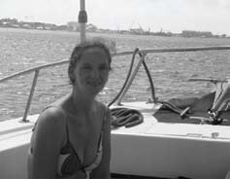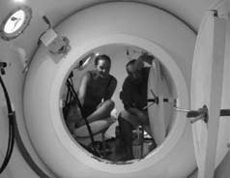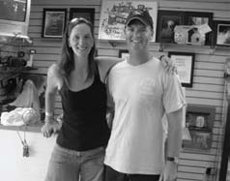




| Home | Features | Club Nights | Underwater Pics | Feedback | Non-Celebrity Diver | Events | 8 August 2025 |
| Blog | Archive | Medical FAQs | Competitions | Travel Offers | The Crew | Contact Us | MDC | LDC |

|

|
 
 |
 |
ISSUE 6 ARCHIVE - AT THE CHAMBERBarbara StevensI meant my trip to Grand Cayman to be my return to regular diving after a three year hiatus during which I had my two children. I learned to dive at Grand Cayman nine years ago and absolutely fell in love with the sport. That this was the first and may possibly have been the last place that I would dive, is to me a bitter irony.I spent a week diving and by the end of it I had forgotten all about the stress of daily working life. That was until the last diving day of my trip. On the first dive of the day there was nothing out of the ordinary: a 100 foot wall dive, the mandatory safety stop, then a slow ascent with plenty of air left – but after surfacing I felt a sharp pain in my back. My first thought was that I had strained my back. I managed to get back on to the boat unassisted but it was downhill from there: I got blurred vision, pain spreading from the back all across the midriff, and, worst of all, I lost control of my legs. |
 |
 |
I will be forever grateful to Rick Bennet
and Patrick Weir, the two Divemasters
from Nick Buckley's Deep Blue Divers who
understood the problem immediately.
They recognised DCI and I was given
oxygen within minutes. The ambulance
was already waiting to take me to the
island's hospital when we returned to
shore. The Divemasters shouted after
me 'Don't worry, you will be fine!'
In hospital I was seen by Denise Osterloh, the most wonderful doctor I could have hoped for. She has years of experience of treating DCI patients and after an initial assessment, I was wheeled into the 'Cayman Hyperbaric Services' Chamber unit. My overriding memory was of the smiling face of Ivan – one of the many volunteers working at the chamber. That smile conveyed such warmth and confidence. It is impossible to overstate the quality of care I received while there. It was their support and humour that helped me more than anything to stay positive in those frightening early days. | |
 |
My symptoms got worse during the first
session and it was clear then – at least to
the doctors – that I would be in for the long
haul. I was diagnosed with what is called
an 'undeserved' hit meaning that there
was nothing in my dive profile to suggest
that I had brought this on. No argument
there! I definitely didn't think I deserved it!
Who does?
No more diving was the verdict, a bitter pill to swallow. A bubble had caused a spinal cord injury resulting in partial paralysis from the waist down. I couldn't move, feel or operate properly. The only theory as to why this might have happened was that I could have a PFO (Patent Foramen Ovale), an undetected hole in the heart. A test for this condition on my return home was recommended. |
 |
|
In the end I was given 12 days of chamber
treatments totalling 64 hours – the longest
being 7 hours – it felt like I was breaking
some sort of record. It was startling to
see how much the oxygen given under
increased pressure aided recovery.
Within four days I was able to stand
unaided, on the fifth, I took my first step.
From then on it was my determination
combined with the aid of a fantastic
physiotherapist, the support of my friend
Margaret (who delayed her return to the
US) and the love and help of my husband
and daughter (who had flown over to
support me) that enabled me to regain
the confidence and ability to walk. Two
weeks later, I was able to board a plane
home assisted only with a walking stick.
Back in the UK, I contacted the London Diving Chamber. Talking to Ben Wilson on the phone, it felt as if my big brother had come to take care of me (and I don't even have a brother!). Ben told me to come down the next day. I was seen by Dr Oliver Firth, the specialist Chamber doctor and he recommended further chamber sessions. Well, I was a pro by now and Ben, with his Antipodean Blue Man Group and Gemma Klintworth, took excellent care of me. There were further improvements in my condition but after 10 days, progress stalled and my mood plummeted and we called it quits. At this point I had spent over 80 hours breathing oxygen and taking air breaks – more time than I had spent actually diving. |
||
|
I have since had a bubble test done and
a PFO was indeed found. It was relief in
one way as it gave an explanation for
the accident. I am told that it is relatively
easy to fix and I am cautiously optimistic
that I will be diving again within a couple
of years of the surgery. My mobility is still
improving and I have been doing a range
of treatments, physio, Alexander Technique
and acupuncture in a push to speed
recovery and to go skiing in February with
my family.
If there are some positives to take out of this experience it is seeing the willingness of so many people, both in the Caymans and here, to provide an amazingly high level of care and support. What would I pass on to other divers from this experience is however competent you are, make extra sure you have sufficient dive insurance and always know how close you are to a unit with a hyperbaric chamber. Finally, a special thanks to Dr. Oliver Firth and Dr. John King who have gone above and beyond their duty to answer every possible question I have had. |
 | |
Previous article « Non-Celebrity Diver Next article » Underwater Photography Back to Issue 6 Index | ||